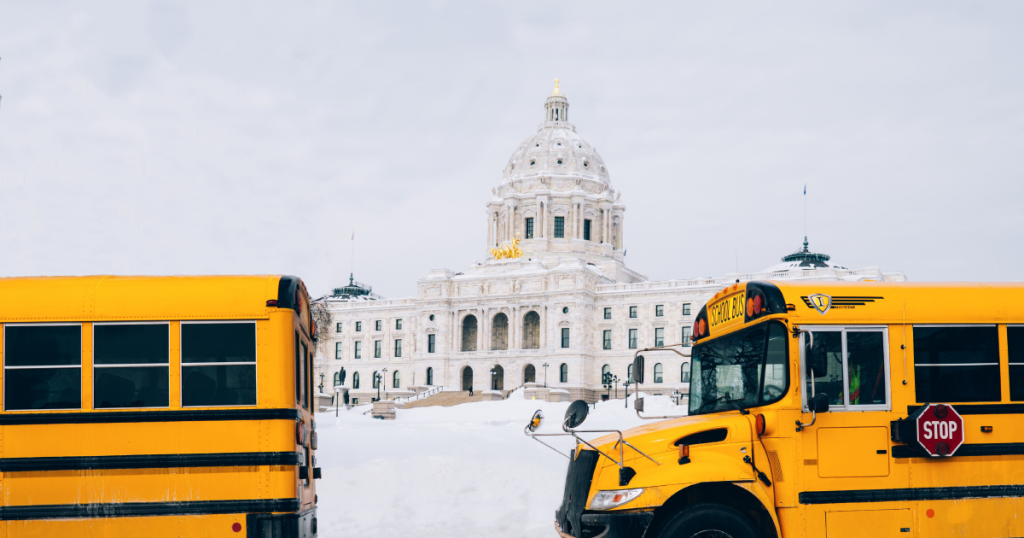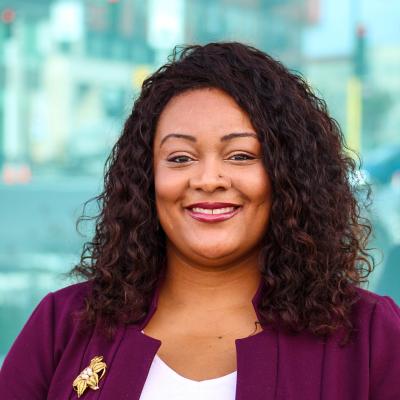Hey, everyone! I’m Danyika Leonard, EE’s new policy director. I joined this amazing and intentional team of brilliant people last year in October. Before joining EE, my world revolved around innovative policy design and implementation through family housing and economic stability, all to support the academic success of students. Now I have the opportunity to advance student-centered education policy using what I know, what I’m learning, and sharing what comes up along the way.
In this inaugural blog, I’ll cover happenings at the capitol, important policy priorities, and share our positions on key education policies we’re watching.
And we’re off!
Minnesota reconvened its 91st legislative session on Tuesday, February 11, but the hustle and bustle around the capitol arrived even sooner. Lawmakers, legislative support staff, associations, and nonprofit organizations have finalized their game plans and policy priorities. Some hope to get a running start. They have good reason. Session is three weeks shorter than normal this year.
For example, the Senate’s E-12 Finance & Policy Committee met on February 5 to hear testimony in response to a bill promoting civics education.This bill adds explicit language to ‘ensure students are adequately prepared to be capable citizens able to fully participate in the political process.’
Education topped the 2020 policy agendas for both the Republican-controlled Senate and DFL-led House. The 2020 Senate Republican Vision and the House DFL 2020 Minnesota Values Plan both seek to shrink the opportunity gap between white students and students of color by giving young Minnesotans a great start through early learning investments, with Republicans adding school choice for families.
Our policy priorities
Competency-based education
EE’s primary focus this session is on passing the Competency-Based Education (CBE) bill (SF485/HF2190). This legislation, which we’ve championed in partnership with legislators, sharpens the focus on educational outcomes rather than time in seats, and empowers teachers to support mastery of academic standards and meet learners where they are.
Last session, the bill was heard in the Senate but not the House, and ultimately was not included in the final education omnibus bill. We will support the efforts of chief authors Sen. Nelson, Rep. Huot, and a bipartisan host of co-authors to move further away from the one-size fits all approach, toward student-centered and personalized learning.
Reimagining teacher preparation
Outside the legislature, EE continues to advocate for better access to diverse and high-quality teacher preparation programs that produce well-rounded teacher candidates. Last year, the Professional Educator Licensing and Standards Board (PELSB) opened the rulemaking process to revise the Standards of Effective Practice for Teachers (SEP), which are the knowledge, dispositions, and skills expected of new teacher candidates.
Over the past year, EE has been advocating for changes to these standards. This included publishing a recommendation memorandum, identifying nine areas that PELSB could strengthen or add in drafting the SEPs. Following the release of the first draft of the new SEPs last fall, we gathered feedback from educators and stakeholders to develop recommendations and submitted a second memorandum with recommendations to improve in key areas, such as the need for more action-oriented language regarding teacher reflections on race and implicit bias, and moving beyond collaboration to strengthen true teacher leadership.
Key issues to watch
Constitutional amendment
Last October, the Minneapolis Federal Reserve Bank released a report reiterating Minnesota’s well-known racial disparities in education as some of the worst in the nation. Last month, former Minnesota Supreme Court Justice Alan Page and Reserve Bank president Neel Kashkari unveiled an initiative to amend Article 13, Section 1 of the state constitution to “Give every child in Minnesota an equal right to a quality education.”
The proposed language moves away from what the Federal Reserve Bank calls ‘access to an adequate education system’ and denotes the state’s ‘paramount duty to ensure all children have a fundamental right to a quality public education.’
While in principle we support the shift in language—guaranteeing that Minnesota students have a “right to quality public education” is better than a “uniform system of public schools”—many questions remain. Who will define ‘quality education?’ Who will be held accountable to enforce this right? How will it be measured? What happens if schools fall short? Minnesota has an opportunity to map uncharted waters with this new language by honoring the needs of students, families, communities, teachers, schools, and other institutions.This policy is certainly one to watch. We will follow it closely and share updates as they arise.
Diversifying the teacher workforce
It is widely agreed among lawmakers, teacher unions, nonprofits, education associations, and other organizations that increasing (and retaining) the percentage of teachers of color and indigenous teachers (TOCAIT) should be at the top of legislative priorities this session.
In 2019, a host of bipartisan lawmakers, through a coalition-led effort (which includes Education Evolving), introduced the Increase Teachers of Color Act of 2019 (HF824/SF1012). The bill featured a robust three-part plan to increase the percentage of TOCAIT. Legislators requested an $80 million appropriation, but received a disappointing $11.1 million, much of which went to existing programs.
The Teachers of Color Act of 2020 seeks to strengthen existing TOCAIT programs with updated policy amendments. A few notable changes include establishing an annual state goal to increase the percentages of TOCAIT, requiring a biennial report on progress toward that goal, and expanding the “Grow Your Own” program to open eligibility to districts, non-licensed employees, parents, and high school students.
We support this bill, especially the Grow Your Own and teacher candidate scholarship programs, that aim to increase the number of teachers of color, American Indian teachers, and teachers in shortage areas. This bill is one to watch.
School choice
Rep. John Lesch is looking at enacting legislation that would freeze any new charter school growth in Saint Paul. He is not alone. The Saint Paul Public Schools Board, Saint Paul teachers union, and advocacy group Parents for St. Paul Schools are looking for ways to prevent further revenue loss from the city’s dramatic decline of public school enrollment, which they largely attribute to the higher student enrollment in charter schools. Proponents of this issue also cite concerns of racial segregation. Others oppose a charter moratorium, saying it takes away family choice, and fails to address student needs unmet by the public school system.
Education Evolving supports greater collaboration between school districts and charter schools, and the expansion of opportunities for teacher and school community-led change in the district sector. But, we oppose a moratorium on charter schools.
Money, money, money, money, MONEY!
Late last year, Minnesota Management and Budget released its Budget & Economic Forecast, reporting a $1.332 billion surplus in the FY 2020-21 biennium. And as the second half of the biennium begins, Minnesota lawmakers, in no small feat, will be tasked with the decision of what should be done about it.
Other policy issues on our radar in 2020
In addition to the above key priorities to watch, we’ll be tracking other important policy issues, including:
- Potential changes to PELSB and/or the tiered teacher licensure system.
- Extending the 2019 safe schools revenue and funding to support and improve access to mental health supports.
- Investing in strategies for positive engagement rather than punitive discipline, especially among very young children, and reducing racial disparities in disciplinary action.
- Increasing the funding to special education, in particular to reduce the “cross subsidy” from general education funding.
- Expanding access to early childhood education, including through Parent Aware scholarships.
- Building upon the Innovation Zones program that EE championed in 2017, including removing the cap on the number of districts.
Let’s connect! What policies do you have your eye on? Reach me at danyika@educationevolving.org.

